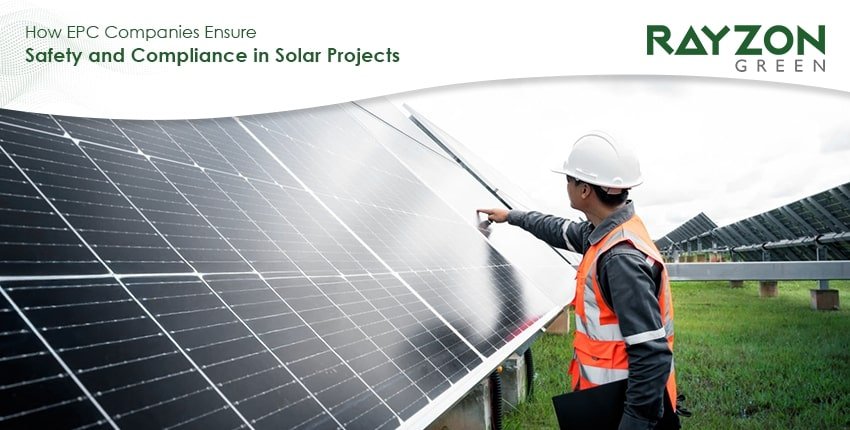
In the fast-paced world of solar energy, safety and compliance aren’t just optional—they're foundational. As India accelerates its clean energy transition, the demand for solar EPC safety and compliance standards has skyrocketed. Whether it’s an industrial rooftop project or a ground-mounted solar park, EPC companies are under pressure to adhere to stringent safety protocols, electrical compliance rules, and environmental regulations.
Solar EPC companies like Rayzon Green are setting new industry benchmarks in solar project safety standards, backed by advanced technology, robust engineering, and deep industry experience. Our mission isn’t just to build solar infrastructure—but to build it safely, responsibly, and sustainably. Learn how we achieve that in every project.
Safety begins before the first panel is ever installed. Reputed EPC firms follow detailed safety guidelines laid out in national and international frameworks like:
EPC safety protocols cover everything from on-site PPE usage to lockout/tagout systems for equipment, crane operation, scaffolding, and working at heights—reducing injury risks during the installation phase.
Explore how we maintain similar compliance across all industrial rooftop projects and ground-mounted installations.
Each installation involves handling high-voltage components. Our engineers are trained in solar panel installation safety, including:
We follow the safety checklist for EPC that includes hazard identification, site-specific risk mitigation plans, and post-installation inspections.
Electrical systems are the lifeblood of any solar project. We ensure 100% electrical compliance in solar EPC by adhering to:
By aligning with these standards, we contribute to quality assurance in EPC while avoiding fines, failures, or grid rejection.
Fire protection in solar EPC is often overlooked—but never by us. Our fire safety strategies include:
Whether you're interested in rooftop or ground-mounted solar systems, fire safety is built into every design.
Industrial sites have complex electrical setups. That’s why compliance for industrial solar plants goes beyond typical residential norms. We perform:
We’ve written more about these best practices in our blog on EPC for industrial-scale solar.
Occupational Health and Safety (OHS) plays a central role in Rayzon Green's project lifecycle. Our policies include:
Read how this contributes to sustainability in our EPC operations.
In India, diverse terrain and weather conditions demand solid risk management EPC India strategies. Our EPC teams conduct:
Want to know how we help clients avoid costly rework? Check our guide on questions to ask before starting an EPC project.
To ensure quality assurance in EPC, our QMS (Quality Management System) includes:
We’ve delivered high-performing and compliant solutions in all our solar EPC services, helping businesses go solar with confidence.
Before any solar panel sees the light of day, the EPC construction safety protocols begin with site surveys and ground leveling. Rayzon Green ensures:
We also train our EPC teams on site-specific emergency protocols, making us a trusted name in solar EPC safety and compliance for even the most challenging terrains.
Learn how we apply these principles across diverse solar environments, including floating and ground-mounted solar systems.
Human capital is the heartbeat of EPC execution. That’s why safety training in solar EPC is an ongoing process at Rayzon Green. We invest in:
We also promote a culture of Occupational Health and Safety (OHS) where safety isn’t just a checklist—it’s a mindset. These initiatives directly contribute to risk management in EPC India, supporting our mission of building a clean energy future.
Adhering to electrical compliance in solar EPC requires familiarity with the key Indian standards such as:
Rayzon Green ensures all systems comply with the latest government regulations and incentives. Whether you're an investor or facility manager, you can rest assured that your solar project is fully regulatory compliant.
Solar safety doesn’t end after installation. Post-installation compliance is a critical part of long-term performance and incident prevention. Our O&M safety protocols include:
These steps ensure continued solar panel installation safety and maximum uptime across all Rayzon Green sites. Learn more in our guide on solar operation and maintenance.
In the era of smart solar, we combine solar EPC safety and compliance with technology to raise the bar:
This makes us not just an EPC provider, but a next-gen solar compliance leader. These innovations enhance our precision-based EPC services and eliminate human error risks in high-scale installations.
Modern solar EPC firms like Rayzon Green are embracing smart safety innovations, including:
We're proud to lead with innovation. Explore our projects and discover how we're shaping the future.
From schools to smart cities and factories to floating solar, Rayzon Green has implemented safe, regulation-compliant solar EPC in:
Our legacy speaks for itself. Dive deeper into our blog archives or see our project portfolio.
Solar power might be clean, but building the infrastructure requires strict compliance and risk control. At Rayzon Green, Solar EPC safety and compliance is integrated at every level—from engineering design to final commissioning.
With the growing demand for solar in India, EPC companies must go beyond minimum regulations to ensure sustainable, safe solar infrastructure. Rayzon Green is doing exactly that—pioneering safe, future-ready solar EPC.
Are you planning a solar project and want a team that puts Solar EPC safety and compliance first? Partner with Rayzon Green to ensure your project meets the highest safety, legal, and quality standards—while maximizing long-term ROI and performance. Let’s make your solar journey a safe and successful one.
Q1. What does solar EPC safety involve?
It includes personal safety equipment, fire protection, electrical standards, and environmental risk mitigation for solar installations.
Q2. How do EPC companies ensure electrical compliance?
They follow international and national electrical codes like IEC, BIS, and IE rules with licensed professionals.
Q3. Why is compliance important in industrial solar?
It ensures seamless integration with existing power systems and avoids safety hazards, penalties, and system failures.
Q4. What are the main fire risks in solar EPC?
Overheating, inverter malfunctions, and poor wiring—avoided through insulation, spacing, and compliance audits.
Q5. How can I verify EPC compliance?
Ask your EPC company for documentation, quality certificates, site safety audits, and post-installation testing reports.